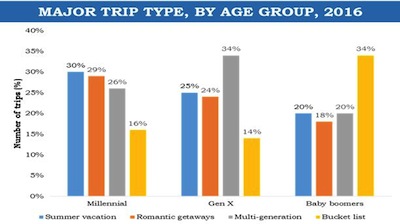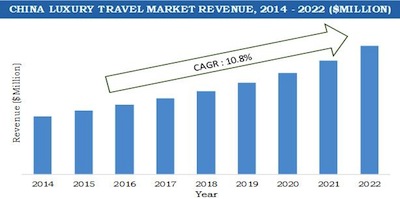
Baby boomers are the leading demographic making up the luxury travel market spend with higher numbers of annual visits, according to Allied Market Research.
The new Luxury Travel Market report shows that luxury travel is increasing with a compound annual growth rate of 6.4 percent, eventually leading the industry to $1.2 billion by 2020. While baby boomers aged 51 to 69 lead the pack, Gen X follows but is more known for preferring to travel with multiple generations of the family such as kids, parents and grandparents.
“The global luxury travel market is expected to garner $1.154 billion by 2022, registering a CAGR of 6.4 percent during the forecast period 2016-2022,” said Priyanka Bisht, research associate at Allied Market Research. “Luxury travel market epitomizes most desirable destinations, luxurious accommodations, convenient transport facilities and authentic travel experience.
“Luxury travel aims in giving exotic experience to its travelers,” she said. “Private jet planes, spas, special menus, private island rentals and private yacht are some of the unique services offered to the luxury travelers.”
Booming luxury travel
Baby boomers are creating the most growth within the luxury travel market likely due to their disposable income and savings and interest in travel along with not having the concern of health constraints that those 70 and up see. Travel is the most popular leisure activity for this generation, with Europe and the Caribbean as the top preferred destinations.

Allied Market Research's graph
Asia Pacific is growing in popularity and has seen the highest growth rate in terms of outbound travel. China is seeing the most trips being taken outside of the country with almost 7 million annual international journeys. The area is seeing a growth in disposable income with millionaires now seeing greater wealth than those in North America.
Affluent consumers are highly interested in unique experiences, focusing on adventure. Consumers are likely to pay more for exciting luxury experiences as of late.

Allied Market Research's graph
Luxury travel is no longer for the elite consumer, but is now expanding to the upper middle class. Many hospitality brands are working to attract these customers, and are extremely qualified employees that can communicate with a wide array of consumers.
Hospitality rankings
Ambercrombie & Kent is a top hospitality brand in the United States, working to appeal to the upper middle class, and is providing a wide array of experiences.
For instance, the luxury travel company and British automaker Land Rover recently renewed their partnership to offer guests a refreshed list of seven self-driven, "off the beaten path" trips around the world.
The continuation of the collaboration across the brands allows the program to gain deeper roots and generate more attention from interested guests. Integrating two like-minded brands with a long-standing partnership allows Land Rover and Abercrombie & Kent to build upon previous trips to curate interesting and new options for consumers (see more).
With consumers becoming more invested in longer vacation stays overseas, Iceland has dramatically increased in interest with not just adventure seekers but with affluent families as well, according to another report by Virtuoso.
2017 Virtuoso Luxe Report showed that Cuba is a highly sought after destination right now, but its culture and landscape might drastically change now that borders have been opened to the United States. Iceland has recently jumped up as a coveted vacation destination and is second for most desired location to Cuba, who took the top slot (see more).
“The luxury travel industry has emerged as one of the fastest growing sectors to contribute significantly to global economic growth and development. Growth in disposable income and increase in upper middle class expenditure has raised the demand for higher service standards,” Ms. Bisht said. “To capitalize the same, market players formulate unique strategies to target the growth in middle class segment; for instance, hiring qualified individuals who can speak international languages and communicate easily with travelers.
“This rise in demand for unique travel experience offers tremendous opportunists for the market players to remain competitive,” she said.
{"ct":"mnRq8Exy2VLVBJHWNXK4vKahnaqcBgvB2v\/9QJ9XfIs7E3pkE7lZ2BDoyOKFqXat4bw5iBEU3Gn8emPoMgjXxCtQ\/fmZcV+jbg+0yxPr7leAyYlfGUz4p8mz8hBaJjC3C87iPbBs8m8ajVxoGPAH0PfprlEJcTL0mse2FeShvgfUQRUgyA5dCRKlYko3m4KI0yNG2GBS8mfdORBwe2nVy6F34Cl7D4x7QHzXII+bjlmebu\/BHFx2l+Jp0vmGvwZklJoZmdT7Zh5wkiOXGfEeOnUfwPXRrNoJ2d1JbpFnGjFLWSbGBS1vStRWuemvTuSIra94kOknikmMAdD8a6G8HvSu2gcHstjEl2DfeIGlgpxH3S50aGSlrZTIc3Y6A7pKRKm06n1YptXc97Pe1fNtlH7E+T8sHqPanAsVjOyYJzPjLHWJGt8V8HnvoVeS3PCK9MKV\/CkJ48A4oAYdSL1KywZAuzMUNiZBjrUwx2fVW2\/UO4YhUbYMm70oPJ+m2IXG8hp9Gv9rJVxfOCk3OhknUUdghsO2RXpNEyG7SrwtC05HYG1+WGJF+WT\/V5tsPSijoZKAO+nw\/TPXllM8JbFsRIsxkDy+4RT7xS\/wUbF2\/NS\/TU34CWw2xhpnnUPVfYzeDZgeC0ADZS+u05kjGhPCZcR0d7BV57rDWCbqTduzh+wMH6WiydB0J2twZ\/WqvQC2nf8jNXBRyr\/DaPL7tHh6mieJTQNXF\/2sHMrkeh4PhrcDzCSrxGVdz5y22XAeGZZdg6z8wP3+njN5pXSN4MPjkVqOb8y8GgGj0b2mxXbo4xHpEM220x\/jt2pDFAspX+\/JkGg\/HFPidF0Tvs0r6uM1\/U\/kvkLxbBH477HFvtPL7gBsN31vYyGL72DxqIV2i\/j3PlSUPW\/Vqworcq5dMxCtpqKyc+epiw+TmzBMK03ZTNRq\/3zlu\/2tPEQBOcXj0TCT3wfpp6ezrH9bSEDY6YyxooXDoFyQOdRdak4E8EURST5M4mBza6T\/j7pn9UJtqF35FJewPEd7QbQKEqhgJr7ryXIY801hrcqLHRGXBXxX50DiSPIdboYPlh8os5HH6lzM3arYcvDn\/edOYCFhnUFdwSl8xsTSWBDv3auvyiva4inTl5sDmmYLPXBGnWPCsjHH1RtvlmZJSdvhb4VPrCQluqK6dQkAQae\/nG\/rnVy2+d++SWLKrwB3Ro2JxJ9+iutSlFpKjIcmaK04Rsmf+FwgJWCXiUbrnR2p8LdYtpYZs8+q24khaqnWLdHVuUK5fnZuKAxtDwwrR4F\/k3CGY3TyAZiRwXUngTAowDjPHvxG0\/+dlqpNwZoNB\/zC033Gfo2yhNUXsHxnwOLCUmHvA+nGLCTFp566V4czYH0fKSc2ZSPCcm1aUr6F4Opyf9UZ6yNfcSquSSEWPIxrF6DiPvHObsMws\/BfvPn1rJjMOo9L8l8PlKqMPnunMOKT1wrfLhpNe3SYZhjmn7rZJgXd6OrX0uGKEd++28toxNIL5X5+e1eEDt8ld7iE3tjPgxV5UjJXOHouNX+CBd9A17eaSLGHovKPYoSKxrarvz\/ezG2JspUv5bsTSbZOtCvD7IjfSEGSdBJcjIqT7sUmTPcvi29xdxIHqQNq0v0rE80bWI+pEAEC0Za7RJFxsOfXaXlKjRd8EYLfwQRHm7ufw\/aRatgxV+IpDfBy0UQILr3Z5nzkyTr1KJN0nIJYh9aQyTmL6ClV5VQ\/Fh97dPeI1wYIu6kaVcTL7f5LQU4yFDqsohTMLrn9I46EoHR+FysSdZag6Al4lS67NC1dhRn4oby4+q\/EPBILGV3ThRJed3SVe3Eh4KadhbpCYu\/Wq5x4ycv4QX1RSH\/8rRUhtWw5u0l8skAVoemC8tk3afUkFiKu7Wi2d4KTp\/BZjVeUhxhUeJ2zODPjt3El31PZ76SYmzzn8\/u1YtlJA2RGiIr1oxdToQH05M4adwKggRMQxs3sV250E459V3n1JGwLj2pqS8p+YSosq0i4lIRh9z40LaEcJtfjAsEa2GhJfoB6oRfB1CmiOJfKNgD4eYTTIPu2WqUyS7WOOZxeOMbgEeZ3d0YR48G0Bto1VgrlPbpZz4McmEpBdUVhAcOBSJj5OsOVF2XAzvmbeZfuv3\/ejhOca09D40L3BA\/RzUyGUzqtb4+WuJ2DMtkoy9EsrVTlg55mLZpVhkGPKV6Zl8eqhugklY4Ff8Ddi7Kt2V8WQV6UlGMuW0oHaJgWgDxiazVS\/QV7Iuio+tG9rG+QILpeHlEQsokV8YHej+ywYjCA0d6AuWZ3+ySlxhDrRDlkSyO+m0ncPQVcsSZXZ6uu8Qkn1QxRB\/rEbl+ifiIsKaL3TMUxk0EZ5QOk78iFCZLq0vLA3KMzXuE9FIYJ1hRrnftj06Tm1g80BghES1wV1j6xVFKpXacPD2YiKNU0aL2+bP\/T2cVRq7wUsCI0vIVgQWDzXzzIigTvqFekRU+dDezn7DUmpGqyhxbNaoD65AtH0qE1xjslWIQoWatEgIHar+bx+hmtcSPmbH7Wl3uKrwpOUoQQaqjMTdqBpr\/H02bimkoQoSmLuo\/HU37Pg0F5C0HghF0hTxP9mab+A61FJAv+5FUj80uC4FA1xO1c2uoTTJgelEtjjfBcqNPEz4xRgnZbnNeek1VDBGSaYddiKgCG3QuaMdZ7MryUG4WWBGwv+3\/\/J+XFOAKS9xywpFPtujS5XBZa7njNeuosmnAPzpVVG7\/NuSIFcQqAqjKXlV0ibRzimKYExA9IFzd68eBnsdxrbUlXvaJLX7hw5VyqSNKfKEaPEEYLnzXR27j\/pFyy+NHJiF5mKud\/C01nvQ4fxkzOnPj69ocBhIIzh48dtJocolTkKNlWzi0fE6c4ylEZ75Kqwk5R5PzX9W4oZzK5eXQBuMIhkhR6eY\/ZshcNM+nFRbJeUOJJpAgd7pXYG255fuv8TReJLayNkV2URiYIWEACeQkpYDLT65QYhBJzxCnPjzA7RGgtNCAZBS8kxze5g5MxQmt582WgFJ2tZyXxNkMchSDA\/6hlnQScU3FzX\/kjMzWjxDm4x6PYLNj3yXl1YtcwAd+53cADUzd5FamFmLUqGbWFh4ZXtjWs+4ZtVwpyIrub7oaN4FH0eynGSMCyNXDhlXu6YHP9GUm3\/AsaBgKca135BNpTR1a4LuPRwkW4hIo3bQKI1zsyvAcaQrcIhFuKzUxTkyWPbtXD4qGFfNxWYhifUioROm4RBQwL4rhPxojdgJQ1D2ZzSA2zvBo6QUVdia3bw8cFNOn5Iu\/4EHQTDnP5u+q9hPWOCl5WgdRx3kk\/FpzVfYsqdcc8H+vfnxeyrcnJEi+2r7Z2RJ+QiA4dn\/O9CB1gKj4fvF9HXA7VlnriwBBOmrv\/7DONyHIggYpUXGlETWNLjadoERgpp\/5wOKKICKGqEffmdsag8rXeYdev87tR1DUtBH+gefefKjsOwHewtGpjzBHil9oreMXLTa6aEyCMUOdB9J5sZrwabcEnwAf2Yg0Jo3k2yJjccU4q+\/Tv4axQQN0FbajAA4bAIgT+YzlhW6qMXhiKoLcRQzfPp\/VwH0FVHsmfqQxgU72c63h5bAXUR3mgKkk0YqsF13eCeOfJW8UlSbnelNzwuLiH6i27UBhw7JsGXjT\/wy7JmfLZhsPflGvqJEkvPjLuS+CzxCBPqGh4x0XLmGkfshBbkTdgKJ\/fKQXOyO5QghsgRNicMcO1wFxmJf9Z680nxxCTmh52satRrDHhhs9zOWo\/uJ8Vw8uFNCquaTD7DJIuzr4IsyQD7Gwfyiq2QwgGLx0Vt2nNoPdFX5zL8Hx98ZJlGro8ZPg36i24tfCqelF9xg++\/70YWUWs+tLY5XErisPbGARpVmEOoFanH\/7tXgsuJa0i1s9111ju2GBBudjPK5\/0SIhP4XEgsJDtLRYGcNCtWfGXUmAUl1WmHAiwI++4uUjgeEP5hKqmJCwbpyOxgUcr+ZEWFaWAgpGWyUTSd4qdM6vlYLVranonaqCkzk07dYyuE15pWXSXoALgce5IB6nWOukChIFHN\/dvVNwdKW5fytktZWCcwDNC61Rn4IFQH5vLZEABHRbbecmZ\/TGw5u0KH5FYp1b9j3LeZknu00AgjGU4nKvMXbhD80Ss5x2YUJOd9Aca6IWsTpJRozVTjl1qBTbS7WqA\/PD7006Jko7R7lbqVfAf2GqFA0G0W4pcOBR6TlpYCIVqwbVQqNSlv0tioQ+hr0wstWVDJ4GTH\/xfZi0fP1+Vx9ENNYSui3KgEYJCJfHCXv29aO9rkwYAsliLb9kNMay0U9AYqBYmwTMaxcIlCsKiVITahbswWYs0LEIRTzDQpE7pMuC6gFdT04RiZHTfL9BwdbW1TAFG6PAKcN8vcphXsp0n3m\/MYXbqmmMPzWICQ90WESUwPqjTgHrGuvGNy4vTTStW1uW4K6H5+BdT1H0DJGMYJVHfnF+f0+RchmjnqZ8YFaUsvYBBGeqa6FWs2hgDCjQ3tY91qWMg3DnxtpBk\/eoO4uDZfWOwLs7TIzXl+Rap0p0z2SbOZ0R3NlE3TwGbeyPvplx+qjMYFtPNFQvSG0a3+qyYe3UBuquX+z5b1tFlfB9aYdFm7hZfMZQj3jI7gQ6g7pegQanH\/0HqWunzKw4hlJUwN6FffB5674\/JmTkvOUYcQMza83hULELoSGG2UV4x3kKw2um7gqF5K+EswH73ZiecMQsbjK8gJn43duG5cMcOwg5UD+qgKgr\/qZW3nSk9Q+P96SLMNBRAXtOtX1kXUG5FAU3eMsaWXOwtd4QExOhhWIXrHAYSFtiV8MuosZ6+W6SLKIBy1bHzSHyAYOltqIfJ3gGRZXkNCSYTgsi9c9eHiGVkM9auZAeUPhJ8JSjxzw7RH1FjKWQ2Li0z9ca5SYVH8zRje3WItYRcwuvPqyBmMyqyIwD6Dkzaoqc1YilteiOcM+DqB3di+tfBkFNYErnEPjuL+64Dddn7rqUz7uzTiaIccc46nKxE7D05tMgkf2pdEYD6dhvuNit4+l+Rih01rPpmd5X\/9hkUg0\/+LjqS2vuULk1M5yghRHFCKKgRI9+glvCl0IxBIZlrp9D2u57+LLJ\/45nE4eTtVEzzED5CCuGDdmE9FLuyBHTPqQdOl6fp0ueUN94YD6SJ356Ax4qiLbKJjAWInjXPv1sN2y097kulDpqiHqupfEGwqBHr+MynNZHPCWGMEU8e8QeFhA0HVuS0KC5LNUx0b9rm2roD3t41JaNJ0ct0kI4n8onvyLHvZrBlOwtb5+IekmMN0Izw8WS2h0FrMnXgBIu3R1y1CWI\/e17iSZbwSlQdbnwuR3SUmjZAEKcd4Am7hqI15rShu5+3sqlVIXmip0xnNoTzNBENeljmtq7eTlBd\/kPugh00Dtx50GCiipnryJZCoLsk25HJuAX1naHxuNlC0HkngvJ3n\/EjEz5nOKTSc014lxVv8ihR7dPuB66a+aD+zo4mn+aoqeIFFr5PrL2XCA6JcRyA4UUCq0aNwbL5EjOz54AllXRdoLkckA8COf8y8JLJhQSwfy8F2\/mf2P3AiBppiIYzyeXL9RxHTKJDlrcE3KAXfr+WBiSPACu7lxon6d31FaNIsq6lTJFJL45PWNev5M6f33Jjv8aOJ6Mjl0APjkLs8tPzRB4iofWxmzQR42XUb0rA6X9b7Tz9p\/YpNe+tFF1nKsWUBrsTbcZCUVgM6uuibR+L275mfmBtwrGD9vADSvilMx6+esdnuhFlmk46DPrr22I8jTHHJIQIejMoDTHtxJfLObKdIDP03viivhxMflUc+FnrrSxOBG7Cj8GLfgXU9\/IAaw6uZ18EBcAXKzOFancXEI96niMYN5zzlR4fz2+AJi5TfnM+9C\/nkhSK68rGPlySZ\/nuvtlKc1eVxFGUoFKWSGTDEXaEt0zjqPz7LOWCMnND3eyOdmFKV56ykC\/vpCJ\/vqPfCEyWnyKesOOXWcE4xbGxMEwfty++59FnLn3sYVGd4rHbX+wJNZht11Z+L5oW86\/aE5TN\/bNOzlll6hOZJr1tFzlWLJHukRvqMpY0BxzdVwdsDqw4ddnEPbQkjxfUIXW539EkJCLNP+C1fWLcZCCyW4FwVLUurlUweAL5IKAYkFejdMNVurRgQtbypNdrsVTQdDN1vNSN1ECLAo1K0dYORSPrbY8gFrWMLH0JEO6PcGJUyN1ppnpVaANbltuco0HTAtjuaeuqLBQeHFm3UgP0UO198KOUk\/wDhHyO4I9tP0RHlxRTwzS5P3AZkXxaZ597J17\/iYk07+BZOxQbNXYMqUA1aWEJ159zpAa1f5kkvwJawiFt52YBa0Q2LKcij0n+kVn31R5ZekX3JQys1wrQB6wYXiwI8uuIV1DH3FPvcPhhiITVO+LYPkl6FZyW4p1UNO1E9GnyMKtZ5QmZRVr5C2XBsPqFm+0z5sAPk285J0jg\/SxefhePhmtI\/GwMlCSRydQO4jO8P+vn5xy3Zkh5mTWV\/56HawGNttF9eRJbgpO0TZEI9CAeU6xAmlVSajYsp3iwSA4nyxIsk0uTKM81cWrbVRjzcqceLpsh6tLx\/Blxuvr5HoOugSCaBk340TnHS+dT7OLJsD0RBzW7p0jJhU7FHmN5k5SR5pxRflm66BySwpfs+pG1PQQwyiC1x1IWcOHrnYJ5PXssr\/eHIz0O9CpDcB8bdQMFZP7dG89mM98RTwfFFIPQyk71d9\/NMc0IVbsUcfEtvjV12SsDKQ8NJRsoEedm0ak1I6dd0DnpTZRr8PqT\/n8gjLmZQZEDfCIvdaWwR7sUlVAWSRTQbLrH4Stg+alEFo65XLlrenXEH3KiP3ZxkVzaiWpe\/mJ\/oBzlJgZth2yW13rYrGSf1gkgATMHXuiwwN1oI+UUrwpyXE7\/Vr0Ikx+cRqfub2GlkhKKKSjN7oLkduamWxqypDRNBdV4ezZMSw\/WvztmwOyY9agJFyQck4ckaxpChhgZvJDoKgOZ3IAdxYedNgzKAKZCMV7vveIrL9W9Q66LeWfH9u3\/09CLHI6S5pKeRoiFWa1cOPlbGByaHCqgJidbOc+\/MZqi9\/ElyUFj6Ky8k9HdmrCQ+k86uev2esvTXvl2q8DsTSt65JrBNKNGyApI1Bl9PVDu6x1RMca\/XUw1gmX\/UnndSf1YDok8sCjiXvKCxbBYV3TzkFv+FUXr+XVqoIKsO\/I4zMvjcu8uCje13EB\/NlUkSSahZgyK6UgdGYB3cPbtq6NYkVdiEf+T5nZS0CeHLA8+\/IIQgxhUf0Pr3HcUulIlK\/V09yoHbNUZGF4c9m2xJo1eZ3cTjO+9Dm3k4npQhkueCfqjjyG2z9t8MCq4+Y2OzkYXho+1vn8G7cWEs5DP1eXLr8Y9Bsc9dCZiP6hSXDt3LYc+gm684fNOyKDSLJNDm+fiyPuMK113ITuep92qJ1VClqjIvV8XAb16dTAUyAUvCo5cXq8IIcstGHuuZtGErfIQS9t9kYknO99HtPdZ3YMIF8V\/pXEPh8EC3EyUQcoyTQsRN0IepdWTP5k7lOs7mU0d5slyIgU4N1rqWEty6QVOLXuALR1ZkwtjlGqufUo0YMW2Vkor6NkULH6\/6PvHB4iXwfVyXqO+yFeiTLZg1kKxB7cURZQ5ej2LkaTGn8SF90NDrAcn98ZP\/VtswXVlWdcSwTFSUwpXNVpYrht9o\/Tyi\/lWFVfeazbwqiEY2v9P1XG2FT2zdL8qxdX19MYDHufg4lNaGOTZIqzlbD1MMLpimzl4zjjWCqpxUKo4G+nF\/fOVtK1h2JjsG9qA5T2wlvVVWKwOhHP\/DRrUm\/4b\/nqzXTNPLLOrh8MT+j6eVZzCXQlN1PR1HHTc+cfsQEtfNxfEWtf373uvPR6mARhTCqqHjBTXu+iDZBQ1rXEupJ+R4aK446TvM9qL5W9sK7xOiitNZa6EEx5BLP8NficEySTBXDlBqzNllIONCgi2BAv6\/77LcpG53ShcqxJiXjhX5FSxH9FyoO1kzN5JjzUXprYatlFPg4vmVs2wPLgvOv8cVKqe41T8gjQIPXN2bsQquZgrJ9J\/EE3MH672rc8ICsvxmVUF5569A+0bisZuH4hWjSVrXm6UgpcCZKNyjWHjGCORgxqzpH6BjoicbLijPzKDb0di4xhhdib3dzdm+G3k4R5EL8j0cq+GiVH\/8KBor\/jPu3+vHDB1b2CIXqxvUlY9NTs\/hOk7TlAnU1TzBKr0DZ5OO9L1qfYeUoebR8Jg31az5YEjnbzyZ5Gqp6uIhNNeFUid+EDyPalMQn\/I4PGgw+g=","iv":"7cb97fc3b9ee59c8f4aa52ff443319a1","s":"c585c9b6cbadbb57"}
